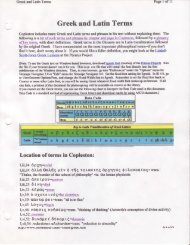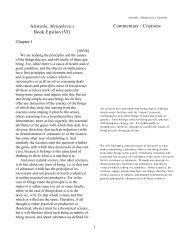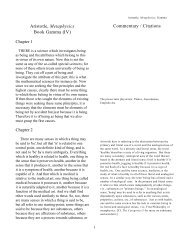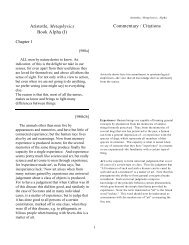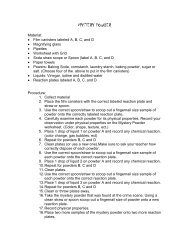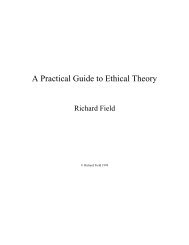Aristotle, Metaphysics Book Zeta (VII) Commentary ... - CATpages
Aristotle, Metaphysics Book Zeta (VII) Commentary ... - CATpages
Aristotle, Metaphysics Book Zeta (VII) Commentary ... - CATpages
Create successful ePaper yourself
Turn your PDF publications into a flip-book with our unique Google optimized e-Paper software.
<strong>Aristotle</strong>, <strong>Metaphysics</strong>, <strong>Zeta</strong><br />
problem stated in them is useful for our inquiries<br />
concerning substance. I mean this<br />
problem:--wherein can consist the unity of that,<br />
the formula of which we call a definition, as for<br />
instance, in the case of man, 'two-footed animal';<br />
for let this be the formula of man. Why, then, is<br />
this one, and not many, viz. 'animal' and<br />
'two-footed'? For in the case of 'man' and 'pale'<br />
there is a plurality when one term does not<br />
belong to the other, but a unity when it does<br />
belong and the subject, man, has a certain<br />
attribute; for then a unity is produced and we<br />
have 'the pale man'. In the present case, on the<br />
other hand, one does not share in the other; the<br />
genus is not thought to share in its differentiae<br />
(for then the same thing would share in<br />
contraries; for the differentiae by which the<br />
genus is divided are contrary). And even if the<br />
genus does share in them, the same argument<br />
applies, since the differentiae present in man are<br />
many, e.g. endowed with feet, two-footed,<br />
featherless. Why are these one and not many?<br />
Not because they are present in one thing; for on<br />
this principle a unity can be made out of all the<br />
attributes of a thing. But surely all the attributes<br />
in the definition must be one; for the definition is<br />
a single formula and a formula of substance, so<br />
that it must be a formula of some one thing; for<br />
substance means a 'one' and a 'this', as we<br />
maintain.<br />
We must first inquire about definitions<br />
reached by the method of divisions. There is<br />
nothing in the definition except the first-named<br />
and the differentiae. The other genera are the first<br />
genus and along with this the differentiae that are<br />
taken with it, e.g. the first may be 'animal', the<br />
next 'animal which is two-footed', and again<br />
'animal which is two-footed and featherless', and<br />
similarly if the definition includes more terms.<br />
And in general it makes no difference whether it<br />
includes many or few terms,-nor, therefore,<br />
whether it includes few or simply two; and of the<br />
two the one is differentia and the other genus;<br />
e.g. in 'two-footed animal' 'animal' is genus, and<br />
the other is differentia.<br />
The issue in this chapter concerns the status of natural<br />
kinds. <strong>Aristotle</strong> is convinced that there are natural kinds.<br />
A human being is a different kind of thing than a horse, and<br />
a horse a different kind of thing than a beetle, etc. Thus it<br />
is not an arbitrary matter that we say that Richard Field and<br />
Bill Clinton are the same kind of thing in a way that they<br />
are different from, say, Secretariat (a horse). But there is<br />
this puzzle co ncerning natural kinds: a natural kind is<br />
something that can be defined, as humanity or horse can be<br />
defined. A definition refers to a set of characteristics<br />
found in all things of a certain kind, as, say, the definition<br />
of human might be "two-footed animal" or a set of two<br />
characteristics: "animality" and "two-footedness" (note that<br />
<strong>Aristotle</strong> does not say this is the true definition of<br />
human--he offers this hypothetically). But a definition<br />
cannot be simply any set of characteristics, since if it were,<br />
any set of things wo uld constitute a natural kind, since all<br />
things share some characteristics. Thus we could say<br />
"brown-haired footed living thing" is a definition of a<br />
natural kind, and say that a brown-haired dog and a<br />
brown-haired human being are the same kind of thing, and<br />
both are different than a blond-haired human being. This<br />
would und ermine the view that there are natural kinds in<br />
the first place. What we must say, then, is that a definition<br />
is a set of characteristics having some special type of unity<br />
not found in all sets of characteristics--but then we have the<br />
question: What sort of unity is this?<br />
<strong>Aristotle</strong> finds the answer in the method of defining<br />
natural kinds--the method of division. We start with a<br />
broad class of things, a genus, such as living things. We<br />
then ask: What sorts of characteristics divide these things<br />
into different types--these characteristics are the<br />
differentiae--such as "capable of motion" divides animals<br />
from plants. T hen within the more restricted genera (pl.<br />
genus), we again divide the types into subtypes by<br />
differentiae. What we find in this process is that the lower<br />
genera and the species (the lowest natural class) are<br />
defined in terms of differentiae that are specifications of<br />
the differentiae of higher genera. Thus, considering<br />
<strong>Aristotle</strong>'s actual definition of humanity offered elsewhere<br />
(De Anima), an animal is something that perceives and acts<br />
(moves) and desires, and a human being, a "rational<br />
animal," is something that can understand what it perceives<br />
and can think about what it desires and how to achieve it.<br />
Thus the difference of the human being, "rational,"<br />
presupposes the differentiae of the the genus animal, which<br />
establishes the so rt of unity that <strong>Aristotle</strong> is looking for to<br />
explain natural kinds.<br />
19



